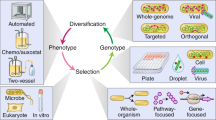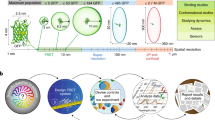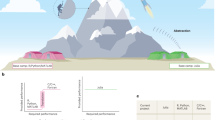Abstract
The Rockefeller Foundation began to support a systematic transfer of physico-chemical technology to experimental biology in the early 1930s. A close look at three key projects in the United Kingdom shows the impact and limits of private philanthropy on scientific innovation.
This is a preview of subscription content, access via your institution
Access options
Subscribe to this journal
Receive 12 print issues and online access
$189.00 per year
only $15.75 per issue
Buy this article
- Purchase on Springer Link
- Instant access to full article PDF
Prices may be subject to local taxes which are calculated during checkout


Similar content being viewed by others
References
Anheier, H. K. & Toepler, S. (eds) Private Funds, Public Purpose, Philanthropic Foundations in International Perspective (Kluwer, New York, 1999).
Condliffe Lageman, E. (ed.) Philanthropic Foundations, New Scholarship, New Possibilities (Indiana Univ. Press, Bloomington and Indianapolis, 1999).
Science and its Cultures (ed.) International Social Science Journal 168 (Blackwell UNESCO, Oxford, 2001).
Abir-Am, P. G. The discourse on physical power and biological knowledge in the 1930s: a reappraisal of the Rockefeller Foundation's 'policy' in molecular biology. Soc. Studies Sci. 12, 341–382 (1982).
Abir-Am, P. G. Beyond deterministic sociology and apologetic history: reassessing the impact of research policy upon new scientific disciplines. Soc. Studies Sci. 14, 252–263 (1984).
Abir-Am, P. G. The Biotheoretical Gathering, transdisciplinary authority and the incipient legitimation of molecular biology in the 1930s: new perspective on the historical sociology of science. Hist. Sci. 25, 1–70 (1987).
Abir-Am, P. G. in Denationalizing Science (eds Crawford, E. et al.) 153–186 (Kluwer Dordrecht, 1993).
Abir-Am, P. G. in Science in the 20th Century (eds Krige, J. & Pestre, D.) 495–520 (Harwood, London, 1997).
Zallen, D. The Rockefeller Foundation and spectroscopy research: the programs at Chicago and Utrecht. J. Hist. Biol. 25, 67–89 (1992).
Kohler, R. E. Partners in Science, Natural Scientists and Foundations (Univ. Chicago Press, Chicago, 1991).
Kay, L. E. Molecular Visions, Caltech, The Rockefeller Foundation and the New Biology (Oxford Univ. Press, Oxford, 1993).
Picard, J.-F. La Fondation Rockefeller et la Recherche Medicale (PUF, Paris, 1999).
Abir–Am, P. G. 'New' trends in the history of molecular biology. Hist. Stud. Phys. Biol. Sci. 26, 167–196 (1995).
Gemelli, G. (ed.) The Unacceptables, American Foundations and Refugee Scholars between the Two World Wars (Presses Interuniversitaires Europeenes, Brussels, 2000).
Gemelli, G. (ed.) American Foundations and Large Scale Research (CLUEB, Bologna, 2001).
Weindling, P. Philanthropy and World Health: The Rockefeller Foundation and the League of Nations Health Organization, Minerva XXXV, 269–281 (1997).
Stapleton, D. H. Internationalism and nationalism: The Rockefeller Foundation, public health, and malaria in Italy, 1923–1951. Parasitologia 42, 127–134 (2000).
Abir-Am, P. G. The assessment of interdisciplinary research in the 1930s: the Rockefeller Foundation and physico-chemical morphology. Minerva XXVI, 153–176 (1988).
Abir-Am, P. G. in American Foundations and Large Scale Research: Construction and Transfer of Knowledge (ed. Gemelli, G.) 71–90 (CLUEB, Bologna, 2001).
Kamminga, H. & Weatherall, M. The making of a biochemist. I: Frederick Gowland Hopkins' construction of dynamic biochemistry. Med. His. 40, 269–292 (1996).
Weatherall, M. & Kamminga, H. The making of a biochemist. II: The construction of Frederick Gowland Hopkins' reputation. Med. His. 40, 415–436 (1996).
Schneider, W. H. Allan Gregg and the Rockefeller Foundation's Medical Sciences Division. Minerva (in the press).
Weaver, W. Medicine: The new science and the old art. J. Med. Edu. 35, 313–318 (1960).
Morange, M. A History of Molecular Biology (Harvard Univ. Press, Cambridge, 1998).
Chadarevian, S. & Kamminga, H. (eds) Molecularizing Biology and Medicine (Harwood, London, 1998).
Abir-Am, P. G. A historical ethnography of a scientific anniversary in molecular biology: the first protein X-ray photo, 1934. Social Epistemology 7, 323–354; 361–362; 372–373; 380–387 (1992).
Perutz, M. F. Is Science Necessary? (Barrie and Jenkins, London, 1989).
Perutz, M. F. Protein Structure (Freeman, San Francisco, 1992).
Keilin, D. The Molteno Institute of Biology and Parasitology (Cambridge Univ. Press, Cambridge, 1951).
Keilin, D. A History of Cell Respiration and the Cytochrome (Cambridge Univ. Press, Cambridge, 1965).
Watson, J. D. The Double Helix (Atheneum, New York, 1968).
Wilkins, M. H. F. John Turton Randall, 1905–1984. Biogr. Mem. Fel. Roy. Soc. 33, 493–535 (1987).
Rasmussen, N. The mid-century biophysics bubble. Hist. Sci. 35, 245–296 (1997).
Weaver's diary, May 26, 1948, Series 401D, Biophysics, King's College, Rockefeller Archive Center (RAC), Sleepy Hollow, NY.
Austoker, J. & Bryder, L. (eds) Historical Perspectives on the Role of the MRC (Oxford Univ. Press, Oxford, 1989).
Dale, H. H. Edward Mellanby, 1884–1955. Biogr. Mem. Fel. Roy. Soc. 1, 193–222 (1955).
Black, D. & Gray, J. Harold P. Himsworth, 1905–1993. Biogr. Mem. Fel. Roy. Soc. 39, 201–218 (1995).
Sayre, A. Rosalind Franklin and DNA (Norton, New York, 1975).
Appel, T. A. Shaping Biology, The National Science Foundation and American Biological Research, 1945–1975 (Johns Hopkins Univ. Press, Baltimore, MD, 2000).
Abir–Am, P. G. Research Schools of Molecular Biology in the UK, US, and France: Science Policy and the Origins of the Biotech Revolution (in the press).
Tate, P. Obituary Notice, David Keilin, 1987–1963. Parasitology 55, 1–28 (1965).
Perutz, M. Keilin and the Molteno. The Cambridge Review, October, 152–156 (1987).
Author information
Authors and Affiliations
Related links
Rights and permissions
About this article
Cite this article
Abir-Am, P. The Rockefeller Foundation and the rise of molecular biology. Nat Rev Mol Cell Biol 3, 65–70 (2002). https://doi.org/10.1038/nrm702
Issue Date:
DOI: https://doi.org/10.1038/nrm702



